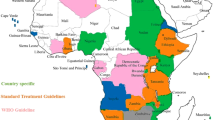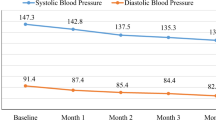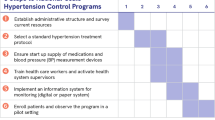Abstract
Hypertension is a leading preventable and controllable risk factor for cardiovascular and cerebrovascular diseases and the leading preventable risk for death globally. With a prevalence of nearly 50% and 93% of cases uncontrolled, very little progress has been made in detecting, treating, and controlling hypertension in Africa over the past thirty years. We propose the African Control of Hypertension through Innovative Epidemiology and a Vibrant Ecosystem (ACHIEVE) to implement the HEARTS package for improved surveillance, prevention, treatment/acute care of hypertension, and rehabilitation of those with hypertension complications across the life course. The ecosystem will apply the principles of an iterative implementation cycle by developing and deploying pragmatic solutions through the contextualization of interventions tailored to navigate barriers and enhance facilitators to deliver maximum impact through effective communication and active participation of all stakeholders in the implementation environment. Ten key strategic actions are proposed for implementation to reduce the burden of hypertension in Africa.
This is a preview of subscription content, access via your institution
Access options
Subscribe to this journal
Receive 12 digital issues and online access to articles
$119.00 per year
only $9.92 per issue
Buy this article
- Purchase on Springer Link
- Instant access to full article PDF
Prices may be subject to local taxes which are calculated during checkout




Similar content being viewed by others
Change history
28 April 2023
A Correction to this paper has been published: https://doi.org/10.1038/s41371-023-00836-8
References
Bromfield S, Muntner P. High blood pressure: the leading global burden of disease risk factor and the need for worldwide prevention programs. Curr Hypertens Rep. 2013;15:134–6.
Roth GA, Mensah GA, Johnson CO, Addolorato G, Ammirati E, Baddour LM, et al. Global burden of cardiovascular diseases and risk factors, 1990–2019: update from the GBD 2019 study. J Am Coll Cardiol. 2020;76:2982–3021.
https://resolvetosavelives.org/assets/Resources/Resolve-to-Save-Lives-Hypertension-Fact-Sheet.pdf. Assessed 1 Mar 2022.
Lim SS, Vos T, Flaxman AD, Danaei G, Shibuya K, Adair-Rohani H, et al. A comparative risk assessment of burden of disease and injury attributable to 67 risk factors and risk factor clusters in 21 regions, 1990–2010: a systematic analysis for the Global Burden of Disease Study 2010. Lancet. 2012;380:2224–60.
Worl Health Organization. Global status report on noncommunicable diseases 2014: World Health Organization; 2014.
Zhou B, Carrillo-Larco RM, Danaei G, Riley LM, Paciorek CJ, Stevens GA, et al. Worldwide trends in hypertension prevalence and progress in treatment and control from 1990 to 2019: a pooled analysis of 1201 population-representative studies with 104 million participants. Lancet. 2021;398:957–80.
Kearney PM, Whelton M, Reynolds K, Muntner P, Whelton PK, He J. Global burden of hypertension: analysis of worldwide data. Lancet. 2005;365:217–23.
Seedat Y. Recommendations for hypertension in sub-Saharan Africa. Cardiovasc J South Afr. 2004;15:157–8.
Ataklte F, Erqou S, Kaptoge S, Taye B, Echouffo-Tcheugui JB, Kengne AP. Burden of undiagnosed hypertension in sub-saharan Africa: a systematic review and meta-analysis. Hypertension. 2015;65:291–8.
Bosu WK, Reilly ST, Aheto JMK, Zucchelli E. Hypertension in older adults in Africa: a systematic review and meta-analysis. PLoS One. 2019;14:e0214934.
Akpa OM, Made F, Ojo A, Ovbiagele B, Adu D, Motala AA, et al. Regional patterns and association between obesity and hypertension in Africa: evidence from the Africa Chair study. Hypertension. 2020;75:1167–78.
Parati G, Lackland DT, Campbell NR, Ojo Owolabi M, Bavuma C, Mamoun Beheiry H, et al. How to improve awareness, treatment, and control of hypertension in Africa, and how to reduce its consequences: a call to action from the World Hypertension League. Hypertension. 2022;79:1949–61.
Michie S, Atkins L, West R. The behaviour change wheel. A guide to designing interventions 1st ed Great Britain: Silverback Publishing. 2014:1003–10.
Owolabi M, Miranda JJ, Yaria J, Ovbiagele B. Controlling cardiovascular diseases in low and middle income countries by placing proof in pragmatism. BMJ Glob Health. 2016;1:e000105.
World Health Organization. Hearts: technical package for cardiovascular disease management in primary health care. 2020.
Al-Makki A, DiPette D, Whelton PK, Murad MH, Mustafa RA, Acharya S, et al. Hypertension pharmacological treatment in adults: a world health organization guideline executive summary. Hypertension. 2022;79:293–301.
Yingxian SJM, Dao Wen W, Nanxiang O, Liying X, Xiaofan G, Chunxia Z, et al. A village doctor-led multifaceted intervention for blood pressure control in rural China: an open, cluster randomised trial. Lancet. 2022;399:1964–75.
Jingi AM, Noubiap JJN, Ewane Onana A, Nansseu JRN, Wang B, Kingue S, et al. Access to diagnostic tests and essential medicines for cardiovascular diseases and diabetes care: cost, availability and affordability in the West Region of Cameroon. PLoS One. 2014;9:e111812.
Akpa O, Sarfo FS, Owolabi M, Akpalu A, Wahab K, Obiako R, et al. A Novel Afrocentric Stroke Risk Assessment Score: models from the siren study. J Stroke Cerebrovasc Dis. 2021;30:106003.
Owolabi MO, Thrift AG, Mahal A, Ishida M, Martins S, Johnson WD, et al. Primary stroke prevention worldwide: translating evidence into action. Lancet Public Health. 2022;7:e74–e85. https://doi.org/10.1016/S2468-2667(21)00230-9. 2021 Oct 29. Erratum in: Lancet Public Health. 2022;7:e14. PMID: 34756176;
Akinyemi RO, Ovbiagele B, Adeniji OA, Sarfo FS, Abd-Allah F, Adoukonou T, et al. Stroke in Africa: profile, progress, prospects and priorities. Nat Rev Neurol. 2021;17:634–56.
Nichols M, Magwood G, Woodbury M, Brown K, Jenkins C, Owolabi M. Crafting community-based participatory research stroke interventions. Stroke. 2022;53:680–8.
Marten R, Mikkelsen B, Shao R, Dal Zennaro L, Berdzuli N, Fernando T, et al. Committing to implementation research for health systems to manage and control non-communicable diseases. Lancet Glob Health. 2021;9:e108–e9.
Dzudie A, Twagirumukiza M, Cornick R, Abdou Ba S, Damasceno A, Rayner B, et al. Roadmap to achieve 25% hypertension control in Africa by 2025. Cardiovasc J Afr. 2017;28:262–73.
De Silva MJ, Breuer E, Lee L, Asher L, Chowdhary N, Lund C, et al. Theory of change: a theory-driven approach to enhance the Medical Research Council’s framework for complex interventions. Trials. 2014;15:1–13.
Linden W, Moseley JV. The efficacy of behavioral treatments for hypertension. Appl Psychophysiol Biofeedback. 2006;31:51–63.
Ogedegbe G, Harrison M, Robbins L, Mancuso CA, Allegrante JP. Barriers and facilitators of medication adherence in hypertensive African Americans: a qualitative study. Ethnic Dis. 2004;14:3–12.
Sibomana J, McNamara R, Walker T. Patient, clinician and logistic barriers to blood pressure control among adult hypertensives in rural district hospitals in Rwanda: a cross-sectional study. BMC Cardiovasc Disord. 2019;19:1–8.
Opie LH, Seedat YK. Hypertension in sub-Saharan African populations. Circulation. 2005;112:3562–8.
Jeemon P, Séverin T, Amodeo C, Balabanova D, Campbell NR, Gaita D, et al. World Heart Federation Roadmap for Hypertension–a 2021 update. Glob Heart. 2021;16:63.
Countdown N. NCD Countdown 2030: efficient pathways and strategic investments to accelerate progress towards the Sustainable Development Goal target 3.4 in low-income and middle-income countries. Lancet. 2022;399:1266–78.
Jaffe MG, Lee GA, Young JD, Sidney S, Go AS. Improved blood pressure control associated with a large-scale hypertension program. JAMA. 2013;310:699–705.
Acknowledgements
This work represents the personal opinion of the author (CVV) and not that of the organization for whom they work. MOO, OMA, RA, BO, AA, APO, and FSS are supported by The National Institutes of Health grants: SIREN (U54HG007479), SIBS Genomics (R01NS107900), SIBS Gen Gen (R01NS107900‐02S1), ARISES (R01NS115944‐01), H3Africa CVD Supplement (3U24HG009780‐03S5), CaNVAS (1R01NS114045-01), Sub-Saharan Africa Conference on Stroke (SSACS) 1R13NS115395-01A1 and Training Africans to Lead and Execute Neurological Trials & Studies (TALENTS) D43TW012030. World Hypertension League.
Author information
Authors and Affiliations
Contributions
PO and MO wrote the first draft. All authors edited and approved the manuscript.
Corresponding author
Ethics declarations
Competing interests
NRCC is a paid consultant for Switch Health. The other authors declare no competing interests.
Additional information
Publisher’s note Springer Nature remains neutral with regard to jurisdictional claims in published maps and institutional affiliations.
The original online version of this article was revised: Due to an error in the abstract.
Supplementary information
Rights and permissions
Springer Nature or its licensor (e.g. a society or other partner) holds exclusive rights to this article under a publishing agreement with the author(s) or other rightsholder(s); author self-archiving of the accepted manuscript version of this article is solely governed by the terms of such publishing agreement and applicable law.
About this article
Cite this article
Owolabi, M., Olowoyo, P., Mocumbi, A. et al. African Control of Hypertension through Innovative Epidemiology and a Vibrant Ecosystem (ACHIEVE): novel strategies for accelerating hypertension control in Africa. J Hum Hypertens (2023). https://doi.org/10.1038/s41371-023-00828-8
Received:
Revised:
Accepted:
Published:
DOI: https://doi.org/10.1038/s41371-023-00828-8
This article is cited by
-
ACHIEVE conference proceedings: implementing action plans to reduce and control hypertension burden in Africa
Journal of Human Hypertension (2024)
-
African Control of Hypertension through Innovative Epidemiology and a Vibrant Ecosystem (ACHIEVE): a holistic approach for hypertension control in Africa
Journal of Human Hypertension (2023)



